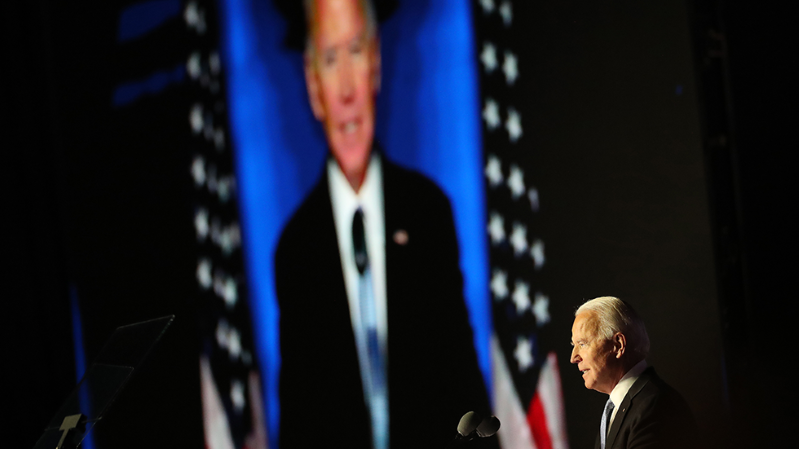By Sylvan Lane, The Hill–
President-elect Joe Biden is earning praise from progressives for tapping a wide range of government veterans and academics to help form an economic team that will be tasked with trying to advance Democratic policies in a deeply divided Washington.
While Biden has not announced any Cabinet nominees, the scholars and economists he picked to lead agency review teams included familiar names in progressive circles.
“Progressives abound on the teams that Biden has named to lead the transition process, but they, much like Biden himself, are institutionalists, not anti-establishment progressives,” wrote Beacon Policy Advisors, a Washington, D.C., research firm, in a Wednesday research note.
Progressives hailed Biden’s decision to tap Gary Gensler, the former chairman of the Commodity Futures Trading Commission, to lead the transition’s review of banking and securities regulators. Despite his tenure at Goldman Sachs, Gensler’s advocacy for tougher rules on complex financial trades has endeared him to industry skeptics.
Other members of the transition team who are favorites among progressives include AFL-CIO policy director Damon Silvers, former Assistant Treasury Secretary Michael Barr and former Deputy Consumer Financial Protection Bureau Director Leandra English.
Biden has also enlisted leading experts on racial economic disparities and discrimination within the financial system for his agency review teams, a welcome sign for progressives who have called on Washington to play a greater role in creating a more equitable economy.
University of California Irvine law professor Mehrsa Baradaran, an expert on financial inclusion and discrimination, has joined the review teams for Treasury and banking and securities regulators. Michigan State University economics professor Lisa Cook, who has extensively studied the economic effects of racism, is also a member of the banking and securities regulation team.
“I think some of this reflects that this administration, for the next two years, will likely rely heavily on administrative reform to help redirect the priorities of the nation and push more fairness and more economic reach for working families and families of color,” said Michael Calhoun, president of the Center for Responsible Lending.
But intraparty battles could flare up once Biden starts nominating key members of his administration.
The plum post will be Treasury secretary.
Sen. Elizabeth Warren (D-Mass.) had been the dream choice among progressives ever since she dropped her presidential bid and endorsed Biden. While she has reportedly privately expressed interest in the job, Warren’s hard-line views and the deep animosity she evokes from Republicans make her unlikely to be confirmed without a substantial Democratic majority.
Instead, Federal Reserve Governor Lael Brainard, the sole Democrat on the central bank’s board, is expected to be a front-runner for the top Treasury post. As a former Treasury undersecretary in the Obama administration and economic adviser to former President Clinton, Brainard’s deep institutional ties and public resistance to the Fed’s regulatory rollbacks could temper some Republican opposition without alienating Democrats.
Brainard could face competition from other potential nominees like former Fed Vice Chairman Roger Ferguson, former deputy Treasury secretary and Fed Governor Sarah Bloom Raskin, Atlanta Fed President Raphael Bostic and Ariel Investments co-CEO Mellody Hobson.
During the Democratic primary, Biden did not emphasize financial regulatory issues as much as some of his more liberal challengers – particularly Warren and Sen. Bernie Sanders (I-Vt.), who expressed interest Wednesday in being Labor secretary.
As Biden’s opponents sought to paint him as insufficiently tough on Wall Street, the former vice president touted his work securing passage of the Dodd-Frank Act, the sweeping post-crisis financial reform law signed by former President Obama in 2010.
Biden sought to bridge divides within the Democratic Party between moderates and progressives and created a task force with Sanders to negotiate a set of shared principles – many of which marked a significant step to the left for the party consensus on financial regulations.
That task force called for the creation of a government-run banking system set up through the Federal Reserve and Postal Service, strengthening Dodd-Frank regulations, and imposing greater separation between commercial and investment banking services.
Accomplishing some of those goals will be nearly impossible without sturdy Democratic majorities in the House and Senate. But Biden has already earned a small victory among progressives in the party with his picks to lay groundwork for that mission.
“It’s good news, but it’s not stunning that there’s a lot of labor and progressive economists across the board,” said Jeff Hauser, director of the Revolving Door Project.
Hauser said that despite Biden’s reputation as a moderate, he has been open to input from the left.
The progressive tilt of his transition team is now troubling some financial sector lobbyists who enjoyed steady regulatory rollbacks under the Trump administration.
The industry is bracing for Biden to appoint a Warren acolyte to lead the Consumer Financial Protection Bureau, meaning an exit for Trump-appointed Director Kathy Kraninger.
The most frequently mentioned and feared choices among financial sector advocates include Rep. Katie Porter (D-Calif.), COVID-19 Congressional Oversight Commission member Bharat Ramamurti and Georgetown law professor Adam Levitin.
“What he has to do is appoint someone who is fair and balanced across the board, understands how banking works, understands how consumers need certain priced products to make ends meet,” said Richard Hunt, president and CEO of the Consumer Bankers Association.
“You should not appoint a director who believes a bank may be guilty before any examination ever occurred,” he added.
When asked if he trusted Biden to do so, Hunt demurred.
“My guess is he just wants to make it sensible and an industry that works and not hindered by over-regulation,” he said. “We’re anxiously awaiting his appointments.”


Leave A Comment
You must be logged in to post a comment.